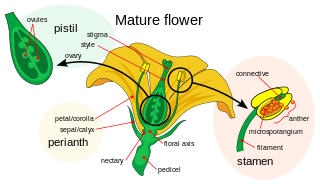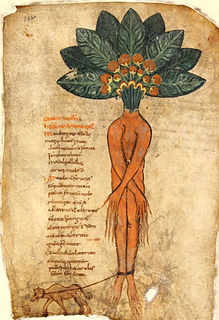Related Research Articles

Chamomile or camomile is the common name for several daisy-like plants of the family Asteraceae. Two of the species are commonly used to make herbal infusions for medicinal uses, although there is no high-quality evidence for health benefits from consuming chamomile tea.

Pedanius Dioscorides was a Greek physician, pharmacologist, botanist, and author of De Materia Medica —a 5-volume Greek encyclopedia about herbal medicine and related medicinal substances, that was widely read for more than 1,500 years. He was employed as a medic in the Roman army.

A sepal is a part of the flower of angiosperms. Usually green, sepals typically function as protection for the flower in bud, and often as support for the petals when in bloom. The term sepalum was coined by Noël Martin Joseph de Necker in 1790, and derived from the Greek σκεπη (skepi), a covering.

Partial Bible translations into languages of the English people can be traced back to the late 7th century, including translations into Old and Middle English. More than 450 translations into English have been written.

A gloss is a brief notation, especially a marginal one or an interlinear one, of the meaning of a word or wording in a text. It may be in the language of the text, or in the reader's language if that is different.

Traditional medicine comprises medical aspects of traditional knowledge that developed over generations within various societies before the era of modern medicine. The World Health Organization (WHO) defines traditional medicine as "the sum total of the knowledge, skills, and practices based on the theories, beliefs, and experiences indigenous to different cultures, whether explicable or not, used in the maintenance of health as well as in the prevention, diagnosis, improvement or treatment of physical and mental illness". Traditional medicine is contrasted with scientific medicine.

A herbal is a book containing the names and descriptions of plants, usually with information on their medicinal, tonic, culinary, toxic, hallucinatory, aromatic, or magical powers, and the legends associated with them. A herbal may also classify the plants it describes, may give recipes for herbal extracts, tinctures, or potions, and sometimes include mineral and animal medicaments in addition to those obtained from plants. Herbals were often illustrated to assist plant identification.

Rembert Dodoens was a Flemish physician and botanist, also known under his Latinized name Rembertus Dodonaeus.

Malva is a genus of about 25–30 species of herbaceous annual, biennial, and perennial plants in the family Malvaceae, one of several closely related genera in the family to bear the common English name mallow. The genus is widespread throughout the temperate, subtropical and tropical regions of Africa, Asia and Europe.

Pseudo-Apuleius is the name given in modern scholarship to the author of a 4th-century herbal known as Pseudo-Apuleius Herbarius or Herbarium Apuleii Platonici. Whoever the author of the text was apparently wished readers to think that it was by Apuleius of Madaura, the Roman poet and philosopher, but modern scholars do not believe this attribution. Little or nothing else is known of Pseudo-Apuleius apart from this.

In botany, a scape is a long internode that forms the basal part or the whole of a peduncle. Typically it takes the form of a long, leafless flowering stem rising directly from a bulb, rhizome, or similar subterranean or underwater structure.
Cotton Cleopatra A.iii is an Anglo-Saxon manuscript once held in the Cotton library, now held in the British Library, and contains three glossaries, providing important evidence for Old English vocabulary, as well as for learning and scholarship in Anglo-Saxon England generally. The manuscript was probably written at St Augustine's, Canterbury, and has generally been dated to the mid-tenth century, though recent work suggests the 930s specifically. The manuscript contains three Latin-Old English glossaries.
The Leiden Glossary is a glossary contained in a manuscript in Leiden University Library, Voss. Lat. Q. 69. The lemmata (headwords) come from "a range of biblical, grammatical, and patristic texts". It is based on an Anglo-Saxon exemplar, and was prepared c. 800 in the Abbey of Saint Gall in modern-day Switzerland.
The history of herbalism is closely tied with the history of medicine from prehistoric times up until the development of the germ theory of disease in the 19th century. Modern medicine from the 19th century to today has been based on evidence gathered using the scientific method. Evidence-based use of pharmaceutical drugs, often derived from medicinal plants, has largely replaced herbal treatments in modern health care. However, many people continue to employ various forms of traditional or alternative medicine. These systems often have a significant herbal component. The history of herbalism also overlaps with food history, as many of the herbs and spices historically used by humans to season food yield useful medicinal compounds, and use of spices with antimicrobial activity in cooking is part of an ancient response to the threat of food-borne pathogens.
The Hermeneumata are anonymous instructional manuals written in the third century CE to teach the Greek language to Latin-speaking people in the Roman Empire, and to teach Latin to Greek-speakers. The word Hermeneumata means "translation" or "interpretation".

Theophrastus's Enquiry into Plants or Historia Plantarum was, along with his mentor Aristotle's History of Animals, Pliny the Elder's Natural History and Dioscorides's De Materia Medica, one of the most important books of natural history written in ancient times, and like them it was influential in the Renaissance. Theophrastus looks at plant structure, reproduction and growth; the varieties of plant around the world; wood; wild and cultivated plants; and their uses. Book 9 in particular, on the medicinal uses of plants, is one of the first herbals, describing juices, gums and resins extracted from plants, and how to gather them.

De Materia Medica is a pharmacopoeia of medicinal plants and the medicines that can be obtained from them. The five-volume work was written between 50 and 70 CE by Pedanius Dioscorides, a Greek physician in the Roman army. It was widely read for more than 1,500 years until supplanted by revised herbals in the Renaissance, making it one of the longest-lasting of all natural history books.
The Corpus Glossary is one of many Anglo-Saxon glossaries. Alongside many entries which gloss Latin words with simpler Latin words or explanations, it also includes numerous Old English glossaries on Latin words, making it one of the oldest extant texts in the English language.
References
- ↑ Das Durhamer Pflanzenglossar: lateinisch und altenglish, ed. by Bogislav von Lindheim, Beiträge zur englischen Philologie, 35 (Bochum-Langendreer: Poppinghaus, 1941), esp. pp. 5-6.
- ↑ Rusche, Philip Guthrie. 2008. ‘The sources for plant names in Anglo-Saxon England and the Laud Herbal Glossary’, in Health and Healing in the Medieval Garden, ed. by Peter Dendle and Alan Touwaide, 128–44. Woodbridge: Boydell and Brewer.
| This article about a book on botany or plants is a stub. You can help Wikipedia by expanding it. |